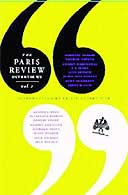
The Paris Review Interviews, vol 1
Introduction by Philip Gourevitch
Canongate £16.99, pp510
If there's one thing we take for granted about much contemporary interviewing, it's an adversarial quality; certainly not, in any case, a collusion between interviewer and subject. But the 16 encounters featured here, culled from a possible 300 and spanning 50 years, subvert that relationship not merely as a modus operandi but as an article of faith. Presented in strict Q&A format with the briefest of scene-setting introductions, each of these 'interviews' saw the light of day only with the interventions and blessing of the writers involved and with significant shaping to ensure that each piece became part of what George Plimpton, the magazine's editor for its first 50 years, called 'a dramatic form in itself'.
Perhaps most fascinating would be a backstage pass into those pre-publication discussions, but, in lieu, these transcripts reveal enough self-deprecation, carefully nurtured rivalry, loftiness both richly deserved and self-deluding and insight into the writing life that they are essential reading for all those loath to adopt the theoretical position that an author's life should be unknown and, what's more, irrelevant to their readers.
Here is Saul Bellow, socking it to his fellow writers in 1966: 'What does the radicalism of radical writers nowadays amount to? Most of it is hand-me-down bohemianism, sentimental populism, DH Lawrence and water, or imitation Sartre.' Or Dame Rebecca West, whose 1981 meeting with a 35-year-old Marina Warner is a peerless exhibition of de haut en bas self-possession. Who would be Warner, flashing her intellectual credentials by pointing out how Ian McEwan had been influenced by St Augustine's theory of evil, only to provoke this response: 'Yes, but he doesn't really do very much with it, does he? This thing just presents you with the hairs along people's groins and the smell and very little else.'
Lest McEwan feel unduly slighted, he might also note that West 'hated Arnold Bennett' and found her affair with HG Wells uninteresting, to say the least.
The sense of writers talking to one another across the years is gripping and cumulatively so. To contrast, for example, Bellow's diagnosis of F Scott Fitzgerald as a writer who couldn't distinguish between innocence and social climbing with Dorothy Parker's lament for the writer of The Great Gatsby's ill-treatment at the hands of Hollywood is illuminating. Meanwhile, Bellow doubts that Hemingway is a great novelist, while Hemingway lauds Joyce as a very great one, who 'would only explain what he was doing to jerks'.
This kind of critical merry-go-round, never entirely divorced from the writer's appraisal of their own worth and reputation, catapults you into the heart of a highly select, unrescuably egotistical and emotionally fragile book group.

